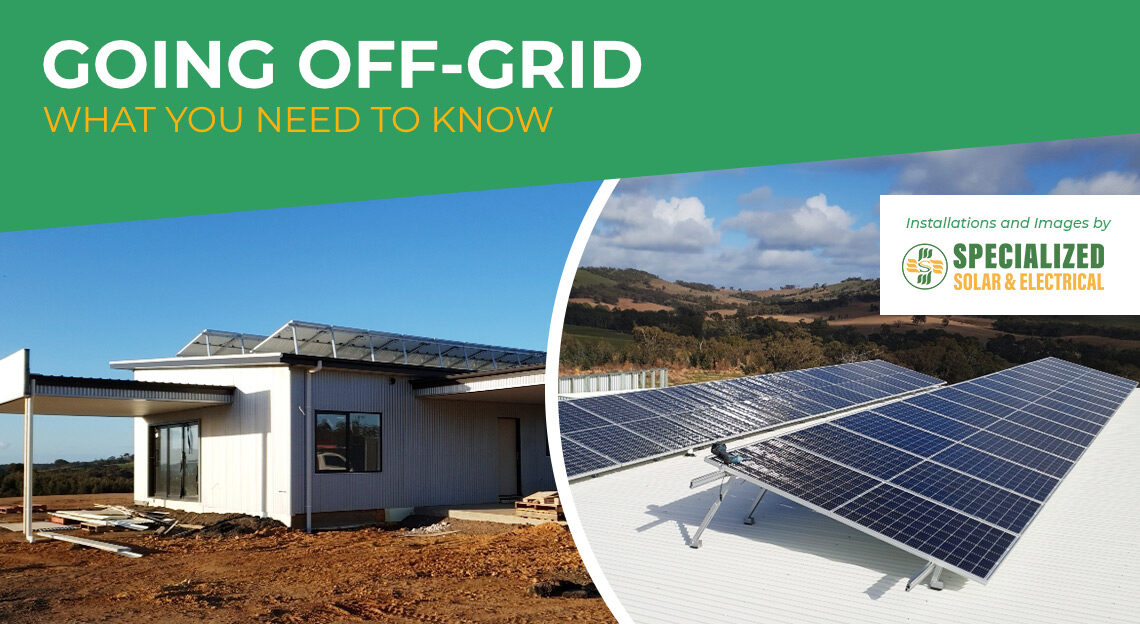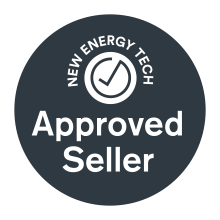Cutting your connection to the national electricity grid has an undeniable appeal. No more electricity bills. No more daily supply charges. And a greener power supply for your home.
But how realistic is it to cut your ties to the grid?
Of course, if you live in the Australian outback with no grid connection for miles, you have no other option than to go off grid for your power supply.
But for the vast majority of us who have a grid connection, is it worth cutting the connection and going off grid? And will you be better off in the long run?
On this blog
This blog explores what going off grid with solar power means, what it costs and whether it’s worth doing.
Keep reading to learn:
- How does an off grid solar system work?
- What are the benefits of an off grid solar system?
- How much does an off grid solar power system cost?
- Why are off grid systems so expensive?
- What types of properties are best suited for off grid solar?
- Is an off grid solar system worth it?
- Should I stay connected to the grid?
- Are there any off grid solar rebates I can claim?
How does an off grid solar system work?
An off grid solar system – also known as a stand-alone power system (SAPS) – is a solar power system that is completely disconnected from the national electricity grid and provides all the power required by your home or business.
An off grid solar system works by generating electricity from solar panels and uses it to charge a solar battery bank using a battery charger. The high voltage direct current (DC) power stored in the batteries is converted – using a solar inverter – to lower voltage alternating current (AC) power for use in your home.
Most off grid solar systems also have an alternative power source – such as a diesel generator – to provide back-up power. This is essential for those times when there is cloudy weather for several days and not enough solar electricity being produced to charge your batteries.
What are the benefits of an off grid solar system?
The main benefits of an off grid solar power system are:
- 100% energy independence
- No electricity bills
- No daily supply charge for electricity
- Protection from rising electricity price
- Reduced carbon footprint
How much does an off grid solar power system cost?
Expect to pay anywhere from $25,000 to $50,000 for an off grid solar system for a 4-person family home with enough battery storage to cover you for 4 or 5 days of cloudy weather plus a generator.
That’s at least double – if not three or four times – the cost of installing a grid connected solar power and battery storage system for the same size house.
Why are off grid systems so expensive?
The reason why off grid solar systems are so expensive is because they are almost always bespoke and require a much bigger battery bank than grid connected solar storage systems.
What types of properties are best suited for off grid solar?
Properties that don’t have an existing connection to the main electricity grid are excellent contenders for an off grid solar system. That’s because connecting a property to the grid can cost tens of thousands of dollars which – in most cases – will be a lot more than the cost of a decent size off grid solar system.
Is an off grid solar system worth it?
Yes, an off grid solar system can be worth the expense if there is no existing power connection to your property and the cost of getting one exceeds the cost of installing an off grid solar system.
Should I stay connected to the grid?
Our answer to this is almost invariably YES. There are three main reasons:
1. Zero dollar bills
You can get zero dollar electricity bills (if that’s your aim) by staying grid connected and installing a large enough solar power system with a decent size battery. What’s more, the cost of installing a grid connected solar system that cuts your bills to zero should be a lot less than an off grid system.
Plus, with a grid connected solar-plus-storage system you should be able to export enough solar power to offset your daily supply charge and power your home 24/7. And on those rare occasions where your system doesn’t have enough power to meet your requirements, you have the grid as a low-cost form of backup power (that’s much cheaper than a massive battery bank + generator).
2. Better for the environment
If you think that off grid is better for the environment, think again. The problem with off grid systems is that any excess solar electricity that can’t be used or stored will go to waste. Whereas if you are grid connected, any surplus solar electricity from your solar system can be exported to the grid reducing the requirement for dirty electricity from coal-fired power plants. And if your off grid system requires a diesel generator for back-up power, that’s a big minus for the environment.
3. Energy trading
Finally, if you stay on grid, you have the opportunity to trade your solar energy either now – or down the track – and get rewarded for it. Distributed energy systems and virtual power plant programs are springing up everywhere. What this means is that by staying grid connected you retain the option to provide power to support the grid which earns you money, improves the reliability of the grid and fast-tracks the transition to 100% renewables.
Which is better, on grid or off grid solar?
If you are connected to the electricity grid, staying connected and installing a solar power and battery storage is generally the best option. It provides you with all the advantages of an off grid solar at a much lower cost. Plus, there are additional advantages like the potential for energy trading which an off grid system can’t offer.
However, if you don’t have a grid connection to your property, then an off grid solar power system will, in most cases, be the best choice. It should be lower cost than connecting your property to the grid and, if designed correctly, should provide all the power needed for your home or business.
Are there any off grid solar rebates I can claim?
Yes, off grid solar systems using approved components will be eligible for the federal government solar rebate, known as STCs (Small-scale Technology Certificates). STCs are based on installed solar panel capacity, so the more solar panels the bigger the rebate. STCs can reduce the upfront cost of a, off grid system by thousands of dollars however even with this rebate, off grid systems are still a big ticket item!
Request an obligation-free quote
If you’d like a quote for an off grid – or grid connected – solar power system, get in touch. We are fully accredited to design and install grid connected and off grid solar power systems. So, if you’re weighing up which is best for you, talk to us today!












